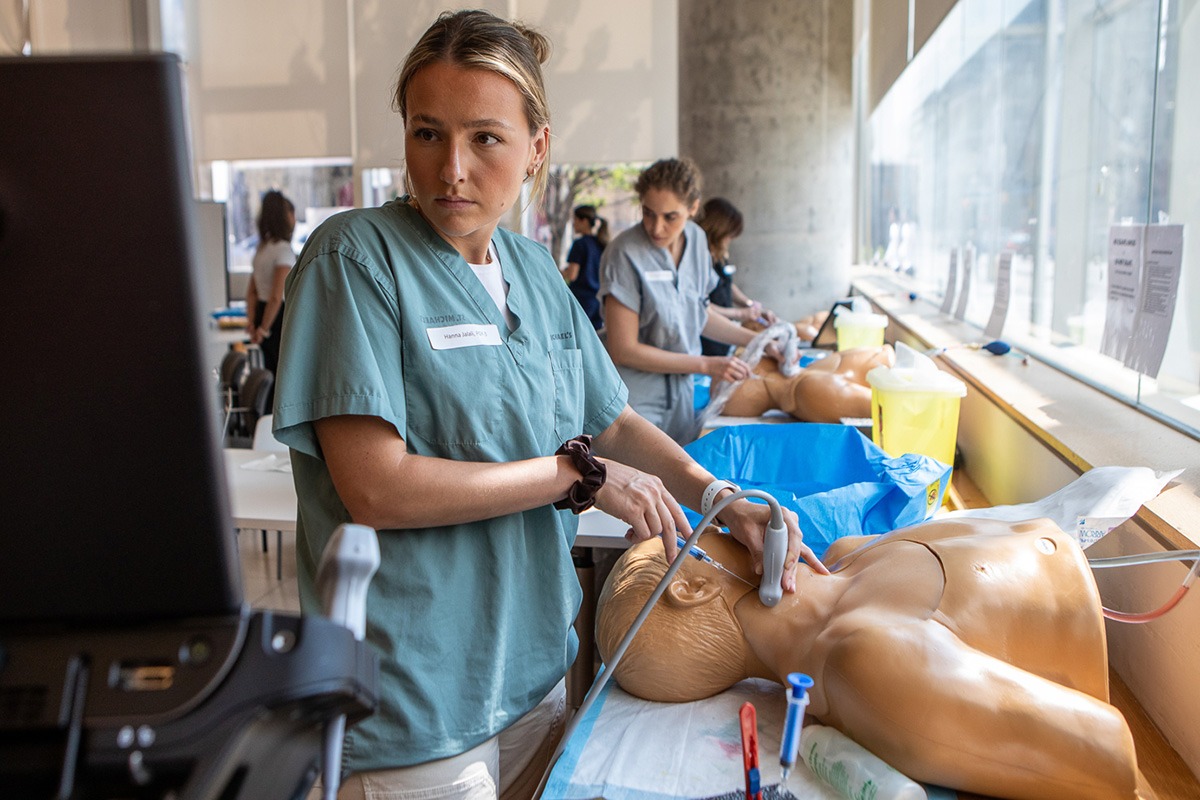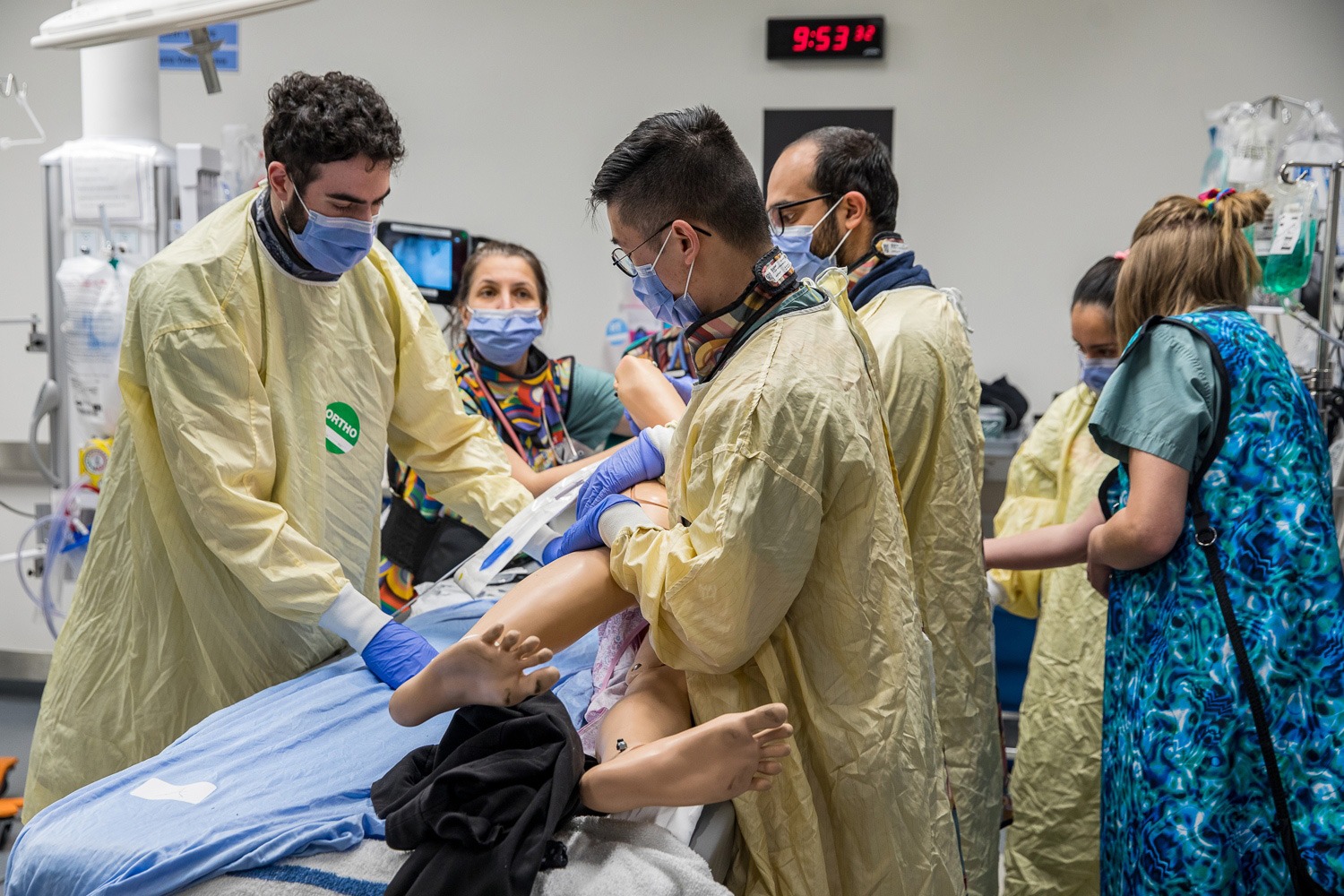Innovations in training and clinical education are essential for hospitals to attract and retain top talent to the health care workforce, and Unity Health Toronto's Simulation Program is at the forefront of this work.
First established in 1996 at St. Michael's Hospital, it has since expanded as part of the network's integration to serve all three hospital sites, including St. Michael's Hospital, St. Joseph's Health Centre and Providence Healthcare.
“Our Simulation Program not only teaches individuals valuable and lifesaving clinical skills but we have the ability to assess systems, policies, processes and spaces for latent safety threats. The Simulation program is expert in both individual and organizational learning," said Beverly Bulmer, Vice President of Education at Unity Health.
“It is an integral part of training for staff and physicians and teams – designed to assess both individual and system activities."
 The Simulation Program team also works closely with the Temerty Faculty of Medicine at the University of Toronto, running multiple of their sub-specialty undergraduate and postgraduate medicine simulation curricula and acts as a hub for faculty development in simulation. Internally, they've developed multiple in-house resources to support staff to learn how to use simulation to aid their work and projects They also offer fellowships, residencies and placements to medical, nursing and health discipline students interested in pursuing simulation, as well as workshops and consultations for health care workers and organizations interested in learning how to build a simulation program in their own organization.
The Simulation Program team also works closely with the Temerty Faculty of Medicine at the University of Toronto, running multiple of their sub-specialty undergraduate and postgraduate medicine simulation curricula and acts as a hub for faculty development in simulation. Internally, they've developed multiple in-house resources to support staff to learn how to use simulation to aid their work and projects They also offer fellowships, residencies and placements to medical, nursing and health discipline students interested in pursuing simulation, as well as workshops and consultations for health care workers and organizations interested in learning how to build a simulation program in their own organization.
In total, the Simulation Program uses state-of-the-art technology to train more than 5,000 participants each year – including staff, physicians and students – and is a key part of onboarding new talent to the organization.
“Simulation is incorporated into many different facets of new hire orientation. Giving new staff the ability to practice their skills in a simulated setting before engaging with patients increases the confidence and competence of our new staff," says Simulation Program Manager Lindsay Beavers.
“Our mantra is, 'no patient should be the first test case for a new clinical space.' You would never get into a car that hasn't been crash-tested, and patients should never receive care in untested spaces with untested policies and procedures."
Unity Health Toronto uses complex simulation experiences with anatomically accurate manikins, elaborate sets, virtual reality tools and other advanced technology tools.
“The Unity Health Simulation Program is more than just education and training - it's a key tool for improving how we work as a system," says Nazanin Khodadoust, Director of Technology Enabled Education at Unity Health Toronto.
“Through simulations, we uncover latent safety threats and work with our clinical teams to test and refine spaces, workflows, policies, and practices."
Khodadoust says that by collaborating with partners like Quality and Safety, engineering, facilities, operational readiness, professional practice, and clinical leaders and educators, the program helps evaluate and improve processes, policies, practices, and physical spaces.
“Ultimately, the Simulation Program drives continuous improvement by connecting education, operations, and system design. It informs updates to organizational practices and policies, helping teams and systems work more safely and effectively," she says.
“At its core, it's about creating smarter spaces, stronger teams, and more resilient processes to meet the demands of future healthcare and deliver better outcomes for our people and our patients and families."
Attracting high-quality talent as a top employer
Unity Health Toronto was named one of Greater Toronto's Top Employers for 2025, marking the fourth consecutive year the hospital network has been given the prestigious recognition as one of the best places to work in the region.
“We must have happy, fulfilled staff if we're going to provide excellent clinical services," says Dr. Tim Rutledge, president and CEO of Unity Health Toronto. “To make that happen, we've really prioritized the way we think about our staff, our training, our support."
Unity Health Toronto is among the region's top employers with a special focus on its use of technology, including advanced simulation that help our people make the most of opportunities for professional development and growth, advance patient care and improve their work lives.
“This incredible recognition is a reflection of the inspiring workplace culture that exists at Unity Health Toronto that emanates from our mission and unwavering commitment to inclusivity," says Manson Locke, Vice President, People & Chief Human Resources Officer at Unity Health Toronto.

“This is the driving force behind the great work we do toattract top talent through competitive compensation and benefits, vacation and time off, and educational opportunities that help make Unity Healt
h Toronto one of the best places to work in the province."
As part of the distinction, Unity Health Toronto was profiled in a special feature published in The Globe and Mail, with a special focus on its use of technology, including artificial intelligence and advanced simulation that help our people make the most of opportunities for professional development and growth, advance patient care and improve their work lives.
Innovations in simulation engaging staff
Unique to Unity Health's Simulation Program is translational simulation, the use of simulation techniques for specific situations in a controlled, safe environment to improve processes and patient outcomes – similar to the way a flight simulator trains pilots.
“This simulation methodology engages our staff and teams and walks them through a process that elevates their voice and expertise," Beavers says. “Emerging studies have shown that when simulations occur before staff work in new/redesigned spaces, communication, feelings of readiness and overall workspace satisfaction improved."
Since simulation touches so many aspects of training and support for many of Unity Health's team, assessment of policies and practices needs to happen within the Simulation Program as well. After recognizing that the Simulation Program only had male-representing CPR training manikins, and that clinical outcomes are worse for those people who have breasts, the team created a custom solution when one wasn't commercially available.
This solution has now been shared with multiple simulation program across the GTA, helping ensure that healthcare workers practice lifesaving skills on manikins that better represent the populations we serve.
The team has also worked closely on the launch of Unity Health's new electronic patient record (EPR) system, to improve the care experience for patients, families and care teams and bring all three hospital sites onto one system.
“Our simulation team is working alongside clinical, practice, IT, and other teams to test workflows for optimization, identify latent safety threats, and inform the development of training curricula," said Khodadoust. “This collaboration is key to ensuring a smoother transition and better outcomes across the institution."